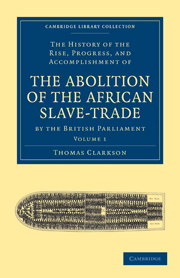Book contents
Summary
The committee, during my absence, had attended regularly at their posts. They had been both vigilant and industrious. They were, in short, the persons, who had been the means of raising the public spirit, which I had observed first at Manchester, and afterwards as I journeyed on. It will be proper, therefore, that I should now say something of their labours, and of the fruits of them. And if, in doing this, I should be more minute for a few pages than some would wish, I must apologize for myself by saying that there are others, who would be sorry to lose the knowledge of the particular manner in which the foundation was laid, and the superstructure advanced, of a work, which will make so brilliant an appearance in our history as that of the abolition of the Slave-trade.
The committee having dispersed five hundred circular letters, giving an account of their institution, in London and its neighbourhood, the Quakers were the first to notice it. This they did in their yearly epistle, of which the following is an extract:—“We have also thankfully to believe there is a growing attention in many, not of our religious Society, to the subject of Negro-slavery; and that the minds of the people are more and more enlarged to consider it as an aggregate of every species of evil, and to see the utter inconsistency of upholding it by the authority of any nation whatever, especially of such as punish, with loss of life, crimes whose magnitude bears scarce any proportion to this complicated iniquity.”
- Type
- Chapter
- Information
- The History of the Rise, Progress, and Accomplishment of the Abolition of the African Slave-Trade by the British Parliament , pp. 441 - 457Publisher: Cambridge University PressPrint publication year: 2010First published in: 1808

